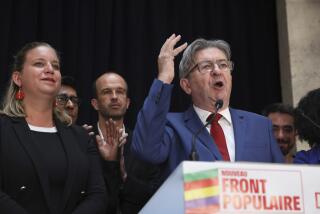Final count shows Iraq vote unchanged
- Share via
Reporting from Baghdad — — Iraq’s national election results were finalized Tuesday, nearly three months after the balloting for parliamentary seats heightened sectarian divisions and generated confusion about the formation of the next government.
The outcome announced by Iraq’s Supreme Court was unchanged from the preliminary result released in March. The election gave a narrow, inconclusive edge to a mostly Sunni coalition headed by secular former Prime Minister Iyad Allawi, with 91 seats, compared with 89 seats for the Shiite slate headed by incumbent Prime Minister Nouri Maliki.
With the announcement, the clock starts ticking on a series of constitutionally mandated steps that are expected to add impetus to lackluster negotiations for a new government.
Within 15 days, President Jalal Talabani is supposed to summon the new parliament for its first session, at which the 325 legislators are to choose a speaker and two deputies. Within 30 days of that first meeting, the parliament is to elect a new president, who will be empowered to ask the leader of the biggest bloc to name a prime minister and form a government.
Negotiations have foundered because of disputes over who heads the largest bloc: Allawi, whose slate won the most seats, or a tentative new alliance between Maliki’s State of Law slate and the third-place winner, a Shiite coalition with 70 seats.
Though the new alliance would seem to have the most seats — 159 — it has been unable to agree on a candidate for prime minister, or even a name for the alliance, making it unclear whether it can legally be defined as constituting a bloc.
Allawi has repeatedly warned of sectarian conflict if the Sunni Arabs who voted for him are disappointed in their expectation that he will be asked to form the next government.
Maliki, meanwhile, seems determined to hold on to his job in the face of objections from his new Shiite Muslim allies, who are insisting that one of their own be named.
The delay in releasing a final tally was caused by numerous challenges by Maliki, who demanded a manual recount in Baghdad and disputed the eligibility of several of the newly elected lawmakers, in an apparent attempt to erode Allawi’s lead. Two of those challenges are still being debated but the final outcome will not change, election officials said.
U.S. Ambassador Christopher Hill said last week that a new government may be formed within the next two months, before the scheduled withdrawal of more than 40,000 American combat troops by the end of August.
But with so much left to be decided and no clear indication of who is likely to be in charge, there’s a good chance the negotiations will drag on even longer, leaving a political vacuum as the troops draw down, said Joost Hiltermann of the Brussels-based International Crisis Group.
Times staff writer Raheem Salman contributed to this report.
More to Read
Sign up for Essential California
The most important California stories and recommendations in your inbox every morning.
You may occasionally receive promotional content from the Los Angeles Times.










